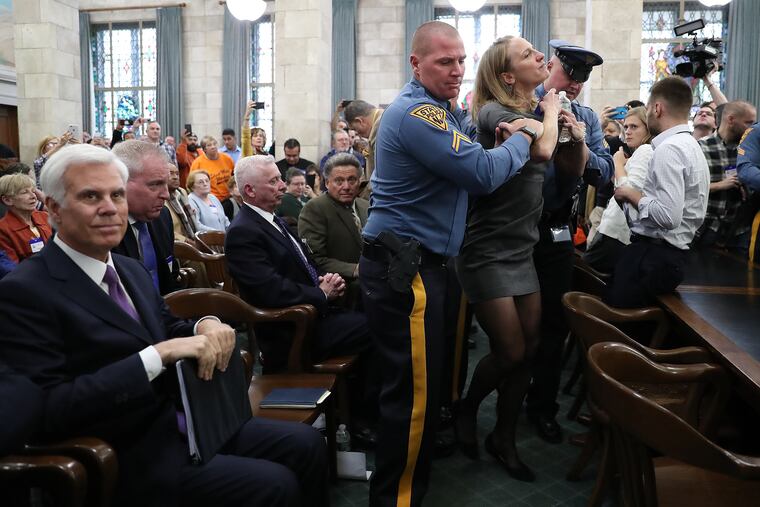The controversial removal of New Jersey activist Sue Altman wasn’t state troopers’ fault, attorney general says
State troopers are not to blame for forcibly removing Sue Altman from a hearing room in the New Jersey Statehouse in November, according to New Jersey Attorney General Gurbir S. Grewal.

State troopers are not to blame for forcibly removing Sue Altman from a hearing room in the New Jersey Statehouse in November, according to New Jersey Attorney General Gurbir S. Grewal.
“The State Troopers who removed Ms. Altman did so because they believed that she was being disruptive during the hearing and refusing to respond to the instructions of law enforcement,” Grewal wrote in a letter Tuesday to members of a joint commission that oversees state capitol facilities.
The incident in question happened when George E. Norcross III, the South Jersey power broker, went to Trenton to testify about a controversial tax-incentive program he has been accused of manipulating. He has denied wrongdoing.
Altman, his most vocal critic, went with a cadre of supporters to confront him. After the hearing started, boos erupted and State Sen. Bob Smith (D., Middlesex) ordered troopers to deal with the distraction. Altman said she wasn’t making any noise and was unfairly targeted. Troopers dragged her out of the hearing room and issued her a citation. Reporters captured it all in photos and video, and the incident reverberated across New Jersey political circles and on social media.
Progressive activists speculated that Norcross, often described as the most powerful unelected person in New Jersey, played a role in her ejection.
But in the letter, first obtained by Politico, Grewal said Altman “was refusing to submit to a lawful request by law enforcement,” and indicated outside influence wasn’t behind her removal.
“There is no credible evidence to indicate that the State Troopers involved in the removal were motivated by political considerations or were acting at the behest of actors opposed to Ms. Altman’s political views," Grewal said.
Altman, head of New Jersey’s Working Families Alliance, took issue with the attorney general’s conclusion.
“I think influence can be exercised in much quieter ways," Altman told The Inquirer on Wednesday. “I think this entire question of how the Senate resources and power were used to create a curated hearing experience for Mr. Norcross is still unresolved.”
Grewal instructed Mercer County prosecutors to dismiss the disorderly conduct citation issued to Altman.
The Attorney General’s Office initially said it would not publicly disclose its findings, but reversed course after public pressure mounted. “This case implicates significant public interests," Grewal said, “in no small part because it raises questions about when and how our state’s residents may exercise their right to petition inside the State House Annex.”
The attorney general acknowledged that the confusion surrounding Altman’s removal needs to be resolved.
“The State capitol complex lacks clear, well-defined rules about what actions constitute disorderly or disruptive conduct during Committee hearings,” Grewal wrote. “Although our State Troopers try their best to maintain order during hearings, they have not been provided clear guidelines about when to remove individuals who present security risks, leaving them to exercise their discretion on a case-by-case basis.”
He also acknowledged that New Jersey activist groups feel a lack of trust with security personnel at the Statehouse complex, which needs to be repaired, and recommended that New Jersey State Police “affirmatively engage with those individuals and organizations who most frequently attend events and protests at the complex, opening lines of communication that can help defuse tension in the long term.”